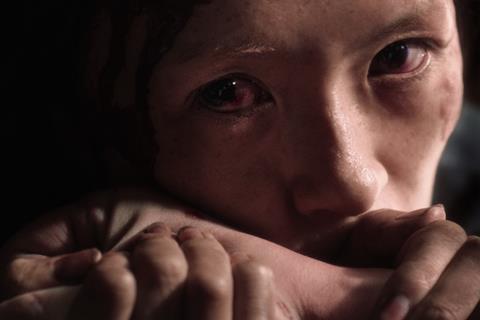Peter Chan delivers a stirring widescreen melodrama set in Shanghai of the 1940s to round out Cannes 2024

Dir: Peter Chan Ho-sun. China. 2024. 150 mins.
The true story of a gruesome murder in 1940s Shanghai is turned into a stirring widescreen melodrama with a message in Hong Kong director Peter Ho-sun Chan’s first Cannes premiere since martial arts drama Dragon, better known as Wu Xia (2011). Programmed out of competition as the final red-carpet gala of a festival that has no official closing film, She’s Got No Name features Zhang Ziyi’s meatiest role in a while as a woman accused of murdering and dismembering her husband in the closing months of the Japanese occupation of mainland China.
Marks the return of Zhang Ziyi as a leading lady
In some ways it’s an unashamedly old-school exercise, one where every tattered cheongsam dress, bloodstained floorboard and iron prison grate has a tactile quality. It’s old fashioned too in tricks like the use of slow-motion footage to drive home poignant moments, or the soft halation effects that bring a mist of memory to the film’s black-and-white flashbacks. But She’s Got No Name gives this historic cause celebre contemporary relevance by first teasing the story as a lurid true-crime tale before revealing it to be a drama of domestic abuse.
In a country that only passed its first domestic violence law in 2015, one that has been rocked recently by a series of high-profile cases and viral Weibo videos, Chan’s film is riding a wave that it should also help to augment. Overseas play will be helped by its widescreen allure, the return of of Zhang Ziyi as a leading lady, and a script that flirts with sentimentality but also has some other more interesting moves – for example, in the way it interlaces supporting characters like pig-headed police commissioner Xue Zhi-wu or Xi Lin, a playwright, journalist and divorcee who takes up the case of the so-called husband-butcher.
The initial name by which Zhang’s character is known is Zhan-Zhou, a combination of the family names of a husband who quite literally owned her. Illiterate, cowed, her face disfigured by a birthmark that marks her out as a pariah, she is found by police huddling in a corner of the wretched apartment she shared with her husband (Wang Chuan-jun) whose heft and stature earned him the nickname ‘Big Bear’. He’s a dismembered corpse by now – all except the head, which will never be found.
Zhan-Zhou confesses immediately, and there’s little doubt at any point that she was responsible. The whodunnit strand in what follows focuses on the search for an accomplice – because the public, stirred up by the media frenzy that follows the gruesome discovery, refuses to believe that such a small woman could kill and carve up such a big guy, or that any woman would ever kill her husband unless she had a lover. But mostly, this is a ‘whydunnit’, one that takes the grand guignol shock-value of the crime and turns it inside-out by depicting the ‘deparaved’ killer as the true victim.
A modern, cigarette-smoking independent woman, Zhao Li-ying’s canny proto-feminist Xi Lin leaps to Zhan-Zhou’s defence, partly for her own gain, in newspaper editorials and a cheesy melodramatic play she writes based on the case. Lei Jia-yin’s bullish police commissioner isn’t interested in motives. He takes this crime as an affront to what he sees as the natural order in which men command and women obey, and he makes it his personal mission to secure her execution.
The 1945 Shanghai of She’s Got No Name is not the decadent city, seen through a haze of opium smoke, familiar from so many movies. It’s a place of grimy tenements where people eke out a living or, like Big Bear, give up and take to gambling. It’s also a place of cold institutional buildings – courtrooms, prisons, a police HQ – that might just as well be in Berlin. The popular theatre where Xi Lin’s plays are performed provides some relief from the dramatic darkness of the backstory sequences, and will invade the main trial story towards the end in the film’s most audacious formal move. There is one posh residence – the family home where the unhappy daughter of Zhan-Zhou’s defence lawyer lives. But this swish abode with its tasteful blend of Chinese, Japanese and European design elements is mostly there to make the point that domestic abuse cuts across class barriers.
Going to trial for the first time on the day before the atomic bomb was dropped on Hiroshima, Zhang-Zhou’s long drawn-out judicial journey spans two administrations, Japanese and Chinese, adding an extra note of jeopardy as documents are burned and death-row prisoners summarily executed. She’s Got No Name is optimistic, perhaps, in using this political transition as a metaphor for a hoped-for attitudinal shift in contemporary Chinese society – but to do so in a film that stands on its own two feet as an empathetic female survivor story at least means that is message will be heard.
Production companies: WE Pictures Limited
International sales: WE Distribution Limited – Fred Tsui, fred.moebius@gmail.com
Producer: Peter Chan Ho-sun
Screenplay: Shi Ling, Jiang Feng, Shang Yang, Pan Yi-ran
Production design: Sun Li
Editing: William Suk-ping Chang, Zhang Yi-bo
Cinematography: Jake Pollock
Music: Natalie Holt
Main cast: Zhang Ziyi, Wang Chuan-jun, Jackson Yee, Zhao Li-ying, Lei Jia-yin, Yang Mi, Da Peng, Li Xian, Fan Wei, Ci Sha, Zhang Zi-feng















![[L-R]: Amanda Villavieja, Laia Casanovas, Yasmina Praderas](https://d1nslcd7m2225b.cloudfront.net/Pictures/274x183/6/4/1/1471641_pxl_20251224_103354743_618426_crop.jpg)








